- Home
- John Barth
The Friday Book Page 11
The Friday Book Read online
Page 11
…English and French and mere Spanish will disappear from the globe. The world will be Tlön. I pay no attention to all this and go on revising, in the still days at the Adrogue Hotel, an uncertain Quevedian translation (which I do not intend to publish) of Browne’s Urn-Burial.‡
This “contamination of reality by dream,” as Borges calls it, is one of his pet themes, and commenting upon such contaminations is one of his favorite fictional devices. Like many of the best such devices, it turns the artist’s mode or form into a metaphor for his concerns, as does the diary-ending of Portrait of the Artist as a Young Man or the cyclical construction of Finnegans Wake. In Borges’s case, the story Tlön, etc., for example, is a real piece of imagined reality in our world, analogous to those Tlönian artifacts called hrönir, which imagine themselves into existence. In short, it’s a paradigm of or metaphor for itself; not just the form of the story but the fact of the story is symbolic; the medium is (part of) the message.
Moreover, like all of Borges’s work, it illustrates in other of its aspects my subject: how an artist may paradoxically turn the felt ultimacies of our time into material and means for his work—paradoxically, because by doing so he transcends what had appeared to be his refutation, in the same way that the mystic who transcends finitude is said to be enabled to live, spiritually and physically, in the finite world. Suppose you’re a writer by vocation—a “print-oriented bastard,” as the McLuhanites call us—and you feel, for example, that the novel, if not narrative literature generally, if not the printed word altogether, has by this hour of the world just about shot its bolt, as Leslie Fiedler and others maintain. (I’m inclined to agree, with reservations and hedges. Literary forms certainly have histories and historical contingencies, and it may well be that the novel’s time as a major art form is up, as the “times” of classical tragedy, Italian and German grand opera, or the sonnet-sequence came to be. No necessary cause for alarm in this at all, except perhaps to certain novelists, and one way to handle such a feeling might be to write a novel about it. Whether historically the novel expires or persists as a major art form seems immaterial to me; if enough writers and critics feel apocalyptical about it, their feeling becomes a considerable cultural fact, like the feeling that Western civilization, or the world, is going to end rather soon. If you took a bunch of people out into the desert and the world didn’t end, you’d come home shamefaced, I imagine; but the persistence of an art form doesn’t invalidate work created in the comparable apocalyptic ambience. That is one of the fringe benefits of being an artist instead of a prophet. There are others.) If you happened to be Vladimir Nabokov, you might address that felt ultimacy by writing Pale Fire: a fine novel by a learned pedant, in the form of a pedantic commentary on a poem invented for the purpose. If you were Borges you might write Labyrinths: fictions by a learned librarian in the form of footnotes, as he describes them, to imaginary or hypothetical books. And I’ll add that if you were the author of this paper, you’d have written something like The Sot-Weed Factor or Giles Goat-Boy: novels which imitate the form of the Novel, by an author who imitates the role of Author.
If this sort of thing sounds unpleasantly decadent, nevertheless it’s about where the genre began, with Quixote imitating Amadis of Gaul, Cervantes pretending to be the Cid Hamete Benengeli (and Alonso Quijano pretending to be Don Quixote), or Fielding parodying Richardson. “History repeats itself as farce”—meaning, of course, in the form or mode of farce, not that history is farcical. The imitation, like the Dadaist echoes in the work of the “intermedia” types, is something new and may be quite serious and passionate despite its farcical aspect.
This is the difference between a proper, “naïve” novel and a deliberate imitation of a novel, or a novel imitative of other kinds of documents. The first sort attempts (has been historically inclined to attempt) to imitate actions more or less directly, and its conventional devices—cause and effect, linear anecdote, characterization, authorial selection, arrangement, and interpretation—have been objected to as obsolete notions, or metaphors for obsolete notions: Alain Robbe-Grillet’s essays For a New Novel come to mind. There are replies to these objections, not to the point here, but one can see that in any case they’re obviated by imitations-of-novels, for instance, which attempt to represent not life directly but a representation of life. In fact such works are no more removed from “life” than Richardson’s or Goethe’s epistolary novels are; both imitate “real” documents, and the subject of both, ultimately, is life, not the documents. A novel is as much a piece of the real world as a letter, and the letters in The Sorrows of Young Werther are, after all, fictitious.
One might imaginably compound this imitation, and though Borges doesn’t, he’s fascinated with the idea. One of his more frequent literary allusions is to the 602nd night in a certain edition of The 1001 Nights, when, owing to a copyist’s error, Scheherazade begins to tell the King the story of the 1001 nights, from the beginning. Happily, the King interrupts; if he didn’t, there’d be no 603rd night ever, and while this would solve Scheherazade’s problem, it would put the “outside” author in a bind. (I suspect that Borges dreamed this whole thing up; the business he mentions isn’t in any edition of The 1001 Nights I’ve been able to consult. Not yet, anyhow: After reading Tlön, Uqbar, Orbis Tertius, one is inclined to recheck every semester or so.)
Borges is interested in the 602nd night because it’s an instance of the story-within-the-story turned back upon itself, and his interest in such instances is threefold. First, as he himself declares, they disturb us metaphysically: When the characters in a work of fiction become readers or authors of the fiction they’re in, we’re reminded of the fictitious aspect of our own existence—one of Borges’s cardinal themes, as it was of Shakespeare, Calderón, Unamuno, and other folk. Second, the 602nd night is a literary illustration of the regressus in infinitum, as are many other of Borges’s principal images and motifs. Third, Scheherazade’s accidental gambit, like Borges’s other versions of the regressus in infinitum, is an unage of the exhaustion, or attempted exhaustion, of possibilities—in this case literary possibilities—and so we return to our main subject.
What makes Borges’s stance, if you like, more interesting to me even than, say, Nabokov’s or Beckett’s, is the premise with which he approaches literature. In the words of one of his editors: “For [Borges] no one has claim to originality in literature; all writers are more or less faithful amanuenses of the spirit, translators and annotators of pre-existing archetypes.” Thus his inclination to write brief comments on imaginary books: For one to attempt to add overtly to the sum of “original” literature by even so much as a conventional short story, not to mention a novel, would be too presumptuous, too naïve; literature has been done long since. A librarian’s point of view! And it would itself be too presumptuous if it weren’t part of a lively, relevant metaphysical vision, slyly employed against itself precisely to make new and original literature. Borges defines the Baroque as “that style which deliberately exhausts (or tries to exhaust) its possibilities and borders upon its own caricature.” While his own work is not Baroque, except intellectually (the Baroque was never so terse, laconic, economical), it suggests the view that intellectual and literary history has been Baroque, and has pretty well exhausted the possibilities of novelty. His ficciones are not only footnotes to imaginary texts, but postscripts to the real corpus of literature.§
This premise gives resonance and relation to all his principal images. The facing mirrors that recur in his stories are a dual regressus. The doubles that his characters, like Nabokov’s, run afoul of suggest dizzying multiples and remind one of Browne’s remark that “every man is not only himself… men are lived over again.” (It would please Borges, and illustrate Browne’s point, to call Browne a precursor of Borges. “Every writer,” Borges says in his essay on Kafka, “creates his own precursors.”) Borges’s favorite third-century heretical sect is the Histriones—I think and hope he invented them—who believe that r
epetition is impossible in history and who therefore live viciously in order to purge the future of the vices they commit; to exhaust the possibilities of the world in order to bring its end nearer. The writer he most often mentions, after Cervantes, is Shakespeare; in one piece he imagines the playwright on his deathbed asking God to permit him to be one and himself, having been everyone and no one; God replies from the whirlwind that He is no one either: He has dreamed the world like Shakespeare, and including Shakespeare. Homer’s story in Book IV of the Odyssey, of Menelaus on the beach at Pharos, tackling Proteus, appeals profoundly to Borges: Proteus is he who “exhausts the guises of reality” while Menelaus—who, one recalls, disguised his own identity in order to ambush him—holds fast. Zeno’s paradox of Achilles and the Tortoise embodies a regressus in infinitum which Borges carries through philosophical history, pointing out that Aristotle uses it to refute Plato’s theory of forms, Hume to refute the possibility of cause and effect, Lewis Carroll to refute syllogistic deduction, William James to refute the notion of temporal passage, and Bradley to refute the general possibility of logical relations. Borges himself uses it, citing Schopenhauer, as evidence that the world is our dream, our idea, in which “tenuous and eternal crevices of unreason” can be found to remind us that our creation is false, or at least fictive. The infinite library of one of his most popular stories is an image particularly pertinent to the literature of exhaustion: The “Library of Babel” houses every possible combination of alphabetical characters and spaces, and thus every possible book and statement, including your and my refutations and vindications, the history of the actual future, the history of every possible future, and, though he doesn’t mention it, the encyclopedia not only of Tlön but of every imaginable other world—since, as in Lucretius’s universe, the number of elements and so of combinations is finite (though very large), and the number of instances of each element and combination of elements is infinite, like the library itself.
That brings us to his favorite image of all, the labyrinth, and to my point. Labyrinths is the name of his most substantial translated volume, and the only current full-length study of Borges in English, by Ana Maria Barrenechea, is called Borges the Labyrinth-Maker. A labyrinth, after all, is a place in which, ideally, all the possibilities of choice (of direction, in this case) are embodied, and—barring special dispensation like Theseus’s—must be exhausted before one reaches the heart. Where, mind, the Minotaur waits with two final possibilities: defeat and death or victory and freedom. The legendary Theseus is non-Baroque; thanks to Ariadne’s thread he can take a shortcut through the labyrinth at Knossos. But Menelaus on the beach at Pharos, for example, is genuinely Baroque in the Borgesian spirit, and illustrates a positive artistic morality in the literature of exhaustion. He is not there, after all, for kicks; Menelaus is lost, in the larger labyrinth of the world, and has got to hold fast while the Old Man of the Sea exhausts reality’s frightening guises so that he may extort direction from him when Proteus returns to his “true” self. It is a heroic enterprise, with salvation as its object—one recalls that the aim of the Histriones is to get history done with so that Jesus may come again the sooner, and that Shakespeare’s heroic metamorphoses culminate not merely in a theophany but in an apotheosis.
Now, not just any old body is equipped for this labor; Theseus in the Cretan labyrinth becomes in the end the aptest image for Borges after all. Distressing as the fact is to us liberal democrats, the commonalty, alas, will always lose their way and their soul; it is the chosen remnant, the virtuoso, the Thesean hero, who, confronted with Baroque reality, Baroque history, the Baroque state of his art, need not rehearse its possibilities to exhaustion, any more than Borges needs actually to write the Encyclopedia of Tlön or the books in the Library of Babel. He need only be aware of their existence or possibility, acknowledge them, and with the aid of very special gifts—as extraordinary as saint- or herohood and not likely to be found in The New York Correspondence School of Literature—straight through the maze to the accomplishment of his work
* Author’s note, 1984: Did I really say this remarkably silly thing back in ’67? Yup, and I believed it, too. What I hope are more reasonable formulations of the idea may be found in the Friday-pieces “The Spirit of Place” and “The Literature of Replenishment,” farther on.
† An ultimacy already attained in the nineteenth century by that avant-gardiste of East Aurora, N.Y., Elbert Hubbard, in his Essay on Silence, and much repeated to the present day in such empty “novelties” as The Wit and Wisdom of Lyndon Johnson, etc.
‡ Moreover, on rereading Tlön, etc., I find now a remark I’d swear wasn’t in it last year: that the eccentric American millionaire who endows the Encyclopedia does so on condition that “The work will make no pact with the impostor Jesus Christ.”
§ It is true that he asserts in another place that the possibilities of literature can never be exhausted, since it is impossible to exhaust even a single book. However, his remark about the Baroque includes the attempt to exhaust as well as the hypothetical achievement of exhaustion. What’s more, his cardinal themes and images rather contradict that passing optimism—a state of affairs reminiscent of the aesthetics of Tlön, where no book is regarded as complete which doesn’t contain its counterbook, or refutation.
More Troll Than Cabbage
INTRODUCTION FOR
TAPE-AND-LIVE-VOICE PERFORMANCES
FROM THE SERIES LOST IN THE FUNHOUSE
AS A BOY experimenting with sin, I once hollowed out a book—it was called 365 Bedtime Stories —to hide a pack of Chesterfield cigarettes in, the way Renaissance princes sometimes packed pistols in eviscerated prayer-books. It had been my thought while writing the series Lost in the Funhouse to publish the finished book with a tape cassette enclosed in that same fashion. I have however a daimon like Socrates’s, who seldom tells me what to do, but (less dependably than Socrates’s) sometimes whispers “For pity’s sake, don’t do that.” Distinctly, when the time came, it announced that the tape-in-a-book idea was an egregious gimmick; that even to print the tape-and-live-voice pieces in reading-script format would be tiresome, unbecoming. In 1968 the book appeared therefore by my own decision in ordinary left-to-right roman type as if composed for print alone like any other book, at cost of part of the sense and most of the entertainment of the tape pieces, which to the eye alone may be wearisomely self-reflexive exercises in hyperselfconsciousness. That’s show business; and for writers as writers, show business is no business.
As show business, on the other hand, those little experiments worked well for a season or two on the campus circuit, until my nay-saying daimon whispered that it was time to close a run that began at the Library of Congress on Mayday, 1967.
Why should a mere introduction to a program of readings be here collected and printed? Because this Friday Book is also a resume of my Stories Thus Far and an account of what I believe myself to have been up to in writing them.
I have a program of readings from my novels that I’ve given here and there on university campuses in the last year. It’s called “The Heroical Curriculum”; what it consists of is a series of excerpts from The Floating Opera, The End of the Road, The Sot-Weed Factor, and Giles Goat-Boy, selected ostensibly to illustrate some of their common themes—that self-knowledge is generally bad news, for example; or that if you don’t look out, you may get pinched between two of the great axioms of Western civilization: Socrates’s lesson that the unexamined life is not worth living, and Sophocles’s lesson that the well-examined life may turn out to be unlivable. But the real motivating principle behind the selections was that they all read well out loud and lead one to suppose that my fiction has been getting better over the years.
If we can only accept that last as granted, I’d like to skip the demonstration today and do a thing more risky from the show-biz point of view: I want to lay on you a sample of the short pieces I’ve been up to since my goat-boy book was finished in 1966. They are what used to be called “exper
imental” pieces: Most haven’t been published yet; some won’t ever be. A few don’t make much ordinary sense out of the context of their neighbors; others were composed specifically for tape and would lose part of their point in print. At least one was composed exclusively for public readings like this one—but I didn’t bring it to Washington with me.
If a writer is not simply going to repeat himself (which isn’t always a bad thing to do), he has to keep changing, more or less reinventing himself. He hopes that the changes are “developments”; that his “stages,” like a rocket’s, are all pushing the same payload toward heaven, in their different ways. He hopes too—since some legs of the trip are liable to be rougher than others—that his audience will stay with him across the troll-bridges and that they’ll reach the sweet cabbage fields together. It may be that there is more troll than cabbage in these pieces; I hope not. I don’t think it’s a good idea, as a rule, for artists to explain their art, even if they can. Jorge Luis Borges puts it arrogantly: God shouldn’t stoop to theology. A modern painter put it more politely and poetically: Birds have no need of ornithology. But since you’ll be hearing these pieces aloud and for the first time, I’ll say one or two things about them and about the series-in-progress from which they’re taken.

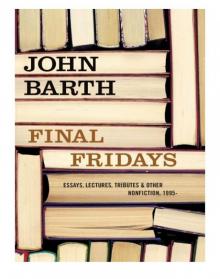 Final Fridays
Final Fridays Where Three Roads Meet: Novellas
Where Three Roads Meet: Novellas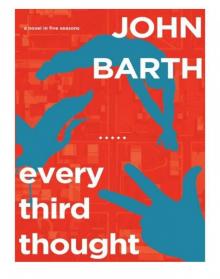 Every Third Thought: A Novel in Five Seasons
Every Third Thought: A Novel in Five Seasons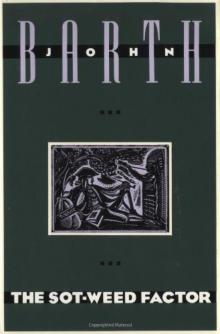 The Sot-Weed Factor
The Sot-Weed Factor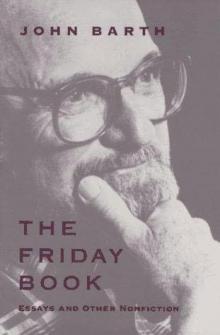 The Friday Book
The Friday Book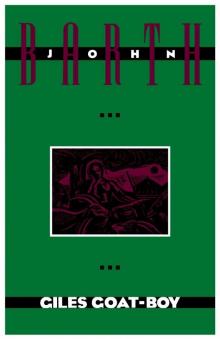 Giles Goat Boy
Giles Goat Boy The Tidewater Tales
The Tidewater Tales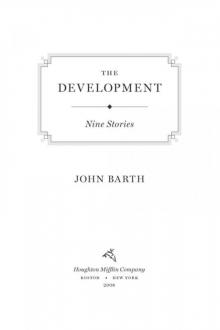 The Development
The Development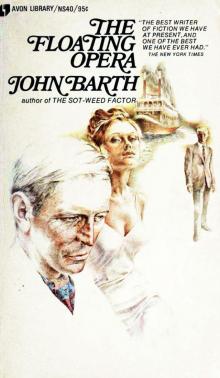 The Floating Opera
The Floating Opera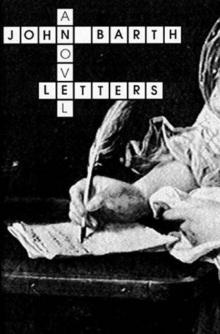 Letters
Letters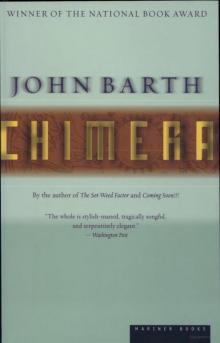 Chimera
Chimera Where Three Roads Meet
Where Three Roads Meet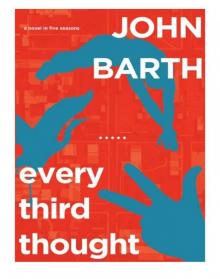 Every Third Thought
Every Third Thought